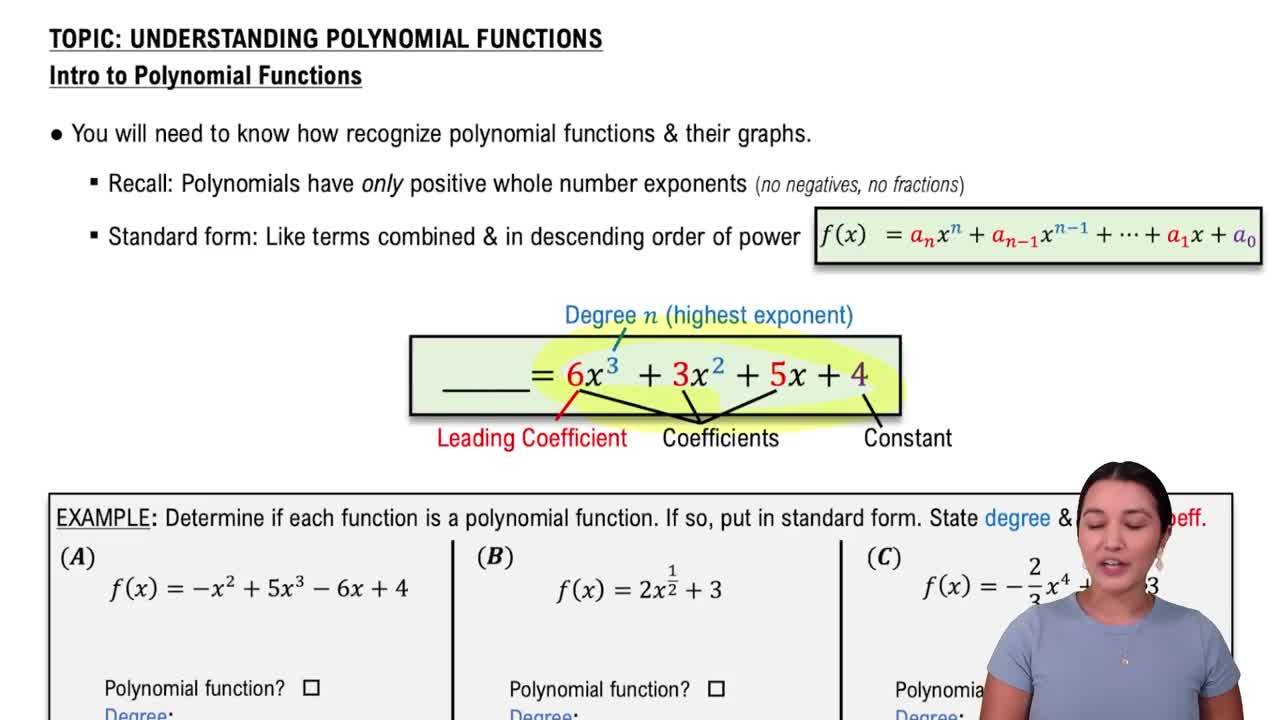Table of contents
- 0. Review of Algebra4h 16m
- 1. Equations & Inequalities3h 18m
- 2. Graphs of Equations43m
- 3. Functions2h 17m
- 4. Polynomial Functions1h 44m
- 5. Rational Functions1h 23m
- 6. Exponential & Logarithmic Functions2h 28m
- 7. Systems of Equations & Matrices4h 6m
- 8. Conic Sections2h 23m
- 9. Sequences, Series, & Induction1h 19m
- 10. Combinatorics & Probability1h 45m
4. Polynomial Functions
Zeros of Polynomial Functions
Problem 115
Textbook Question
Find all complex zeros of each polynomial function. Give exact values. List multiple zeros as necessary.* ƒ(x)=x^6-9x^4-16x^2+144
 Verified step by step guidance
Verified step by step guidance1
<Step 1: Recognize the polynomial structure.> The given polynomial is $f(x) = x^6 - 9x^4 - 16x^2 + 144$. Notice that the powers of $x$ are all even, which suggests a substitution might simplify the problem.
<Step 2: Make a substitution.> Let $u = x^2$. Then, the polynomial becomes $u^3 - 9u^2 - 16u + 144$. This is a cubic polynomial in terms of $u$.
<Step 3: Solve the cubic equation.> Use methods such as factoring, synthetic division, or the Rational Root Theorem to find the roots of the cubic equation $u^3 - 9u^2 - 16u + 144 = 0$. These roots will be the values of $u = x^2$. Let's denote these roots as $u_1, u_2, u_3$.
<Step 4: Find $x$ from $u$.> For each root $u_i$, solve the equation $x^2 = u_i$ to find the corresponding values of $x$. This will involve taking the square root of each $u_i$, giving $x = \pm\sqrt{u_i}$.
<Step 5: List all complex zeros.> Combine all the solutions from Step 4 to list all complex zeros of the original polynomial $f(x)$. Remember to include both positive and negative square roots for each $u_i$.
Recommended similar problem, with video answer:
 Verified Solution
Verified SolutionThis video solution was recommended by our tutors as helpful for the problem above
Video duration:
7mPlay a video:
Was this helpful?
Key Concepts
Here are the essential concepts you must grasp in order to answer the question correctly.
Polynomial Functions
A polynomial function is a mathematical expression involving a sum of powers in one or more variables multiplied by coefficients. The degree of the polynomial is determined by the highest power of the variable. Understanding the structure of polynomial functions is essential for analyzing their roots, which can be real or complex.
Recommended video:

Introduction to Polynomial Functions
Complex Zeros
Complex zeros of a polynomial are the values of the variable that make the polynomial equal to zero, which can include both real and non-real (complex) numbers. According to the Fundamental Theorem of Algebra, a polynomial of degree n has exactly n roots in the complex number system, counting multiplicities. Identifying complex zeros often involves factoring or using the quadratic formula.
Recommended video:

Complex Conjugates
Factoring Polynomials
Factoring polynomials involves expressing the polynomial as a product of simpler polynomials or linear factors. This process is crucial for finding the zeros of the polynomial, as the zeros correspond to the values that make each factor equal to zero. Techniques such as synthetic division, grouping, or applying the Rational Root Theorem can aid in the factoring process.
Recommended video:
Guided course

Introduction to Factoring Polynomials
Related Videos
Related Practice



